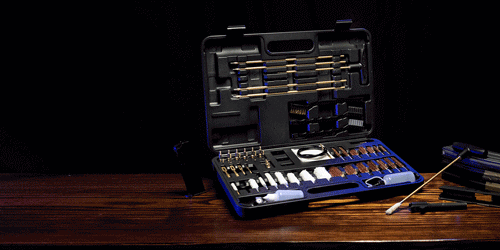Shooting guns or going hunting isn't just a sport for many people—it's an important part of their culture and heritage. However, even if you love hunting or shooting guns, you will not deny that the loud noise of the gunshots can be very disturbing and annoying that can affect your otherwise enjoyable experience.
Exposing yourself to dangerously loud noises can cause hearing loss and tinnitus—a buzzing, ringing sound in the ears that can be distracting, painful, and disruptive. While nobody wants to miss out on the fun of shooting and hunting activities, taking precautionary measures to prevent hearing loss is one of the smartest things you can do.
How Can Guns Cause Hearing Loss?
Guns are one of many sources of loud noise that can cause hearing damage. Loud noises, especially those with intense peaks and valleys, can hurt your ears even when you don't notice any pain. People with normal hearing sensitivity can develop NIHL (Noise-Induced Hearing Loss) over time if they repeatedly experience brief but intense exposures to sounds over 85 decibels (dB).
Typical city traffic registers around 70 dB, while an orchestra measures between 90-100 dB. A gunshot blasts between 140-160 dB; each shot is nearly as dangerous as standing next to an airport runway during takeoff!
What are the Effects of Hearing Loss?

If you've ever experienced significant hearing loss, you know that it doesn't just affect your ears. The nervous system processes sound, which means that damage can occur throughout your body and lead to much more serious problems—including tinnitus (ringing in your ears) and chronic headaches.
Studies show that hearing loss also leads to:
- Anxiety and depression
- Heart-related diseases
- Issues with balance (Vertigo) resulting in falls
- Loss of interest in social meetings (isolation)
- Mental deterioration
- Reduced income (due to inability to perform well at work)
- Many more challenges
Practical Tips to Protect Your Ears While Hunting or Shooting
Preventing your ears from exposure to loud shooting noise is better than treating your hearing loss because of negligence. So, next time you go out hunting in the woods or head to the gun range, keep your ears healthy and prevent hearing loss by following these practical tips:
- Always use some hearing protective device (HPDs)
- Don’t use guns in environments where the sound echoes
- Use small caliber weapons for hunting and target shooting
- Use double ear protection when shooting with high caliber firearms
- Avoid participating in group shooting activities
- Prefer single-shot guns over semi-automatic firearms
Choose the right protective gear for shooting sports
Get adequate ear protection: Earmuffs and earplugs are your first line of defense against sounds over 85 dB. To avoid the hearing problems before they develop further, invest in top-quality ear protection for all your shooting or hunting activities.
High-quality earplugs can protect your ears from damage up to about 30 dB. Many would find it an extra task to carry protective gear, but it can make a huge difference when you find yourself exposed to constant high noise levels for an extended period.
Let’s look at the two main ear protections:
Earplugs
You will need earplugs if you are a regular hunter or shooter or if you hear shootings daily. Earplugs are cheap, simple, reusable, provide decent sound protection for your ears when used properly, and can be helpful for those who use firearms as part of their job (e.g., military service members). Earplugs generally offer up to 32 decibels of noise reduction, which is enough to protect your ears when you're shooting targets out with other shooters around you.
Earplugs come in different varieties:
· Custom
These earplugs are custom-made according to your ear shape, so they are high-quality and very comfortable ear protection for regular usage. Mostly, professional shooters go for custom earplugs.
· Electronic shooter earplugs
Electronic earplugs use digital sound technology to reduce noise. These earplugs are smaller and more effective, so many firearm users prefer them over electronic earmuffs.
· Reusable shooter earplugs
These are the simplest version of earplugs made of foam, putty-like material (easily moldable), or silicon.
Shooting Ear Protection
If you use firearms only occasionally, then shooting ear protection are a better option. To protect your ears, you need earmuffs with an NRR rating of at least 26dB if you are firing high-powered guns. Those who shoot lower-velocity weapons, such as pistols and rifles, should get earmuffs with an NRR rating of 22dB for adequate protection. Moreover, you can use earmuffs along with earplugs for better ear protection.
What I Pick

Gloryfire Shooting Ear Protection provide excellent noise reduction for shooters, hunters, construction workers, etc. These high-quality earmuffs will help protect your ears against noises such as firearms shooting and machinery noise shooting while being comfortably fit!
Features
Pros
- Perfect noise cancellation
- Lightweight and portable
- Comfortable fit
- Slim design (doesn’t hinder shooting)
- Makes conversation easier





